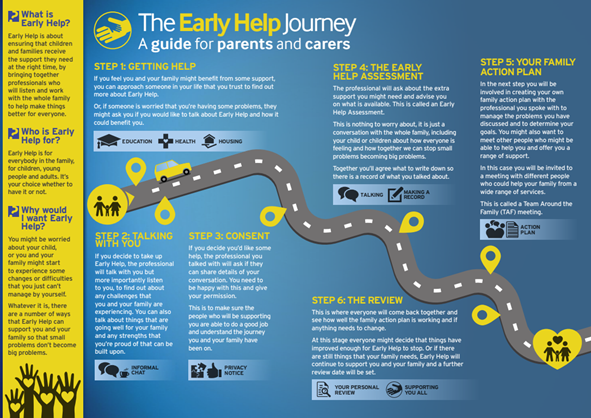Early Help/Targeted Support
Early Help/Targeted Support Team
Abi Kefford SENDCo akefford@johnclareprimary.org
Sarah Nicolson Headteacher snicolson@johnclareprimary.org
Early Help Assessments (EHA)
The Early Help process differs between counties. In order to understand which county’s process we need to follow depends on the county in which your doctor’s surgery is located.
The Early Help journey for families in Peterborough starts with an Early Help assessment. It is important that this is an impartial and honest assessment of strengths, opportunities and challenges that is undertaken with the family, and only ever with their permission. It should be completed when more than one unmet need would benefit from a multi-agency support approach.
The Early Help Assessment is normally initiated by a trusted professional with whom the family already have a relationship and with whom they are happy to share their concerns and worries. All professionals supporting families will have been provided with the opportunity to engage in training to ensure they are skilled and knowledgeable to work with the family.
Early Help assessments (EHAs) are used as a gateway to access several other forms of support e.g. a Family Worker, specialist sleep support etc.
Peterborough has three locality-based Multi-Agency Support Group (MASG) Early Help panels. The MASG panels are multi-agency groups of professionals that use their skills, knowledge and expertise to consider multi-agency interventions that will best meet the assessed needs of a child/family. Cases to be considered are usually where:
- The needs are either unclear or such that additional resources are needed;
- The family have been supported in the Community through an Early Help Assessment and Team around the Family (TAF) meetings but little progress has been made;
- There have been difficulties in developing an effective multi-agency support plan;
- A transition package of support may be required for a family who have recently been open to Children’s Social Care who need a range of co-ordinated targeted support to maintain and sustain progress;
- Practitioners have identified the need for more specific, targeted and sometimes, funded pieces of work to more appropriately address the needs of a family.
The Early Help/Targeted Support Process at John Clare:
- Parent and teacher discussions over concerns.
- Class teacher discusses with Mrs Kefford (SEND concerns) or Mrs Nicolson (non SEND/Safeguarding concerns).
Depending on the number of cases in operation within school, there may be a waiting time for the process to begin. All our leads have other important roles to also maintain within school.
- Lead professional established.
- Early Help Assessment forms emailed out to parents.
The more detail provided in these forms regarding the concerns and the desired outcomes, the quicker the forms are cleared through the Peterborough Gateway.
Should you have any questions about the Early Help/Targeted Support process, please do not hesitate to speak to our team or your child’s class teacher.



